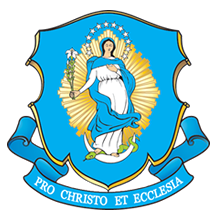
Why do we celebrate birthdays? Fundamentally, a birthday celebration expresses the goodness of life. In every birthday, there is somehow included the goodness of our creation. There is the garden of Eden, with Adam and Eve still struck with awe and wonder at the beauty of it all, and all given to them by God's providential hand. This is one reason why gifts are given on birthdays: They signify the first gift, life, and the other gifts of creation we are able to experience through life. As the Catechism reminds us, "if man exists it is because God has created him through love, and through love continues to hold him in existence" (27). In this sense, a birthday celebration is a celebration of love.
When we celebrate someone's birthday, however, we are not celebrating life or love in some lofty, abstract sense. Rather, we celebrate this particular person's life, a concrete birth and backstory that is different from our own. To the Creator's love we add our love, and we re-affirm our relationship with both God and the birthday person in this celebration.
Birthdays acquired a far greater importance, however, on the day when God Himself was born. Even in our secularized culture, Christmas outshines any birthday in its universality and magnificence. And even if the generosity of gift-giving is clouded in a mad rush of shopping, the symbolism of the gift remains. For those who remain attentive to "the reason for the season," indeed, it is increased. The Gift of Christmas is far greater than the gift of creation, for now God is giving Himself.
How did Christ give Himself to us? Through Mary. How does Christ still give Himself to us today? Through the Church, of which Mary is both mother and model. Vatican II's document on the Church Lumen Gentium (The Light of the Nations) says: "The Church indeed, contemplating [Mary's] hidden sanctity, imitating her charity and faithfully fulfilling the Father's will, by receiving the word of God in faith becomes herself a mother" (64). This happens through Baptism, by which we enter the supernatural life of Christ and the sacramental life of the Church. Once born of an earthly mother, we are now "born again" of a spiritual mother, the mother of Jesus.
The Constitutions of the Congregation of Marian Fathers refer to Mary as follows: "she is the image of the new man capable of a relationship with God and others, the beginning of the new People of God and the seed of a new humanity." We who are born into the People of God through Baptism are indeed "a new humanity." The Easter Vigil Exsultet exaggerates not a whit when it proclaims: "Our birth would have been no gain, had we not been redeemed." While birth is important in our natural life, this life is elevated and perfected by the spiritual "re-birth" of Baptism. We owe Baptism to the Church founded by Jesus during His earthly life; we owe the birth of Jesus (and thus of the Church) to Mary.
Now that we've reflected on the importance of Mary's birthday, I'd like to offer some concrete ways to celebrate this day. A birthday party would not be out of place: Jesus comes "wherever two or three are gathered in [His] name" (Mt 18:20), and of course He would invite His mother. One could also choose to recite a part of the Rosary, particularly the Joyful or Glorious Mysteries, which focus more on Our Lady. To read and ponder Scripture attentively would also be in keeping with Mary's spirit. Best of all would be to attend Mass on this liturgical feast, savoring both the special Scripture readings and the Son of Mary in the Eucharist. However you celebrate, may your holy day be filled with the quality of Mary's great Canticle of praise: "My soul proclaims the greatness of the Lord; my spirit rejoices in God my Savior" (Lk 1:46).
















